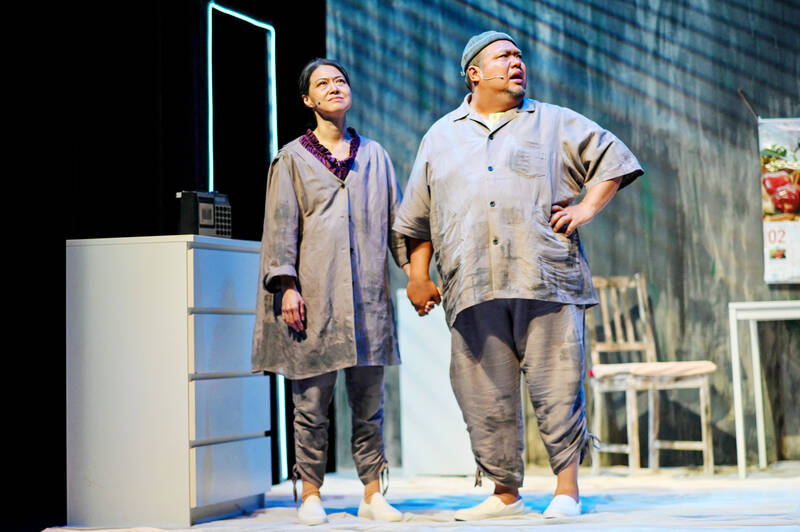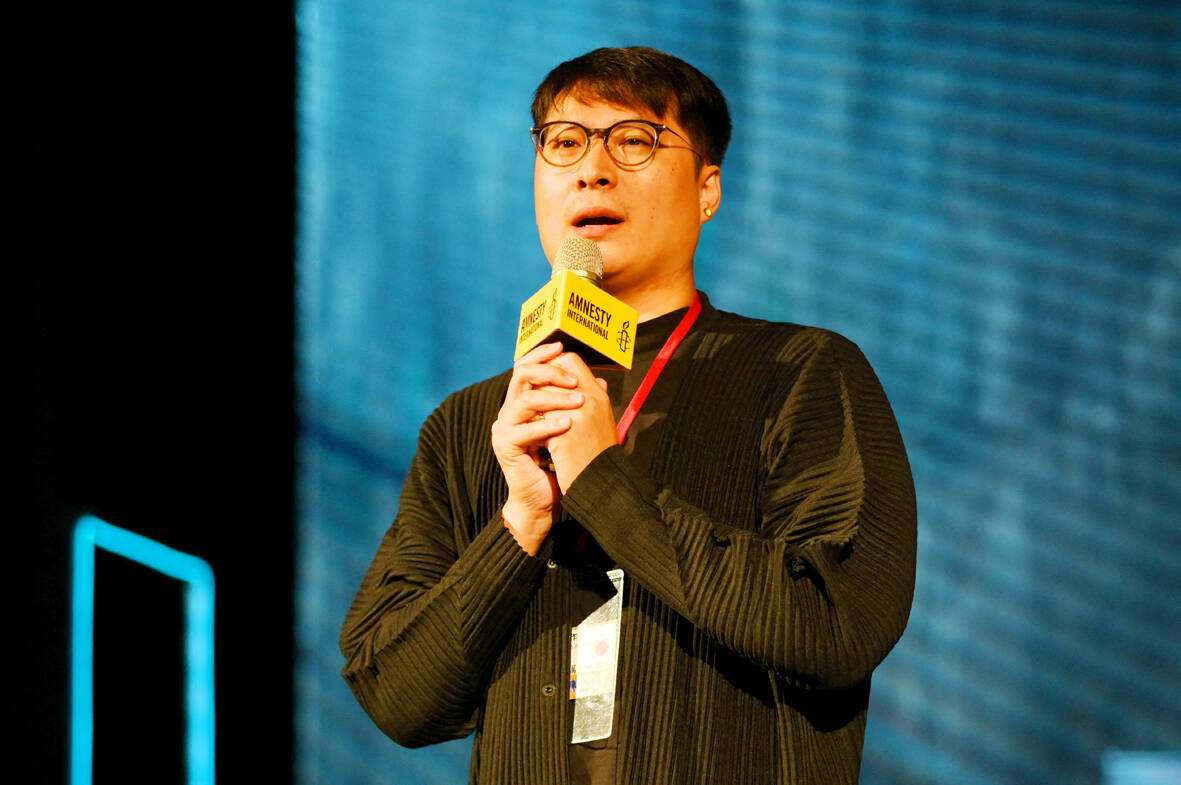Avant garde street performance, politically charged theater, pro-democracy music and poetry — powerful works of art dealing with China’s bloody Tiananmen Square crackdown that were once commonplace in Hong Kong have all but disappeared in recent years.
For decades, tens of thousands of people gathered annually in Hong Kong’s Victoria Park for a candlelight vigil marking June 4, 1989, when Chinese troops moved into Beijing’s Tiananmen Square to quell peaceful protests calling for reforms.
Hundreds, by some estimates more than 1,000, were killed in the crackdown.

Photo: AFP
Any mention of the day — let alone commemoration — has long been forbidden in mainland China, but the massive turnout every year in Victoria Park stood as an enduring symbol of the special freedoms Hong Kong enjoyed, even after its return to Chinese rule. But since Beijing imposed a national security law on the city in 2020 to quash dissent, authorities have suppressed public events mourning the Tiananmen crackdown, and artistic output commemorating the pivotal day has shriveled.
Hong Kong artist Luk Ming remembers how more than a dozen people took part in interpretive performances in the bustling district of Causeway Bay on the anniversary’s eve in 2009.
“The performers were not artists, but the everyman — there was a taxi driver, a teacher, and so on,” Luk said, using a pseudonym due to fear of repercussions.

Photo: AFP
As part of the “Our Generation’s June 4” art project, some performers had covered their bodies with yellow paint — a color associated with the city’s pro-democracy camp — as a representation of “freedom and hope,” Luk said.
“People were proactive then... with many trying to tell others about the crackdown lest we forget.”
Though a few hardcore artists might try to sustain the tradition, he added, “will they continue to put it out there under so much uncertainty?”
Just last year, on the day before the anniversary, artist Chan Mei-tung was bundled into a police van mid-performance for “misconduct in public places” and detained overnight.
The offending piece had seen her whittle a potato into the shape of a candle — once distributed by the thousands at the annual Tiananmen vigil — and hold a lighter to it.
‘SAFEGUARD A MEMORY’
In 2019, Hong Kong was rocked by massive, and at times violent, protests over an unpopular bill that morphed into a months-long movement calling for broader democratic change. The ensuing crackdown saw more than 10,000 people arrested, though more than 6,000 have yet to be formally charged.
Meanwhile, three organizers of the annual Tiananmen vigil have been charged with “incitement to subversion” under the national security law — an offense punishable by up to 10 years in prison. There has also been what amounts to an erasure of Hong Kong’s public memorials to Tiananmen: a museum run by the vigil’s organizers was shuttered, monuments were removed from universities and dozens of books about the 1989 crackdown were pulled from libraries.
For the fourth year running, June 4 is expected to be a neutered affair. Hong Kong Chief Executive John Lee (李家超) has issued vague warnings that “any act that is in breach of the law” will see police enforcement. Given the climate in Hong Kong, some artists have transplanted their works to more receptive soil.
For the past three years, Lenny Kwok, a Hong Kong musician who has organized commemorative concerts since 1990, has hosted an operetta marking the anniversary in Taiwan.
A mixture of music, poetry and storytelling, the show will open this year in a Taipei park with the reading of a poem by Nobel laureate Nelly Sachs, who fled Nazi rule during World War II.
“All the nations are ready to rise up from the map,” the poem begins.
Kwok said he believes the desire for freedom and democracy in both Hong Kong and Taiwan is closely connected to the Tiananmen incident.
“We are here to safeguard a memory that is being gradually erased, rewritten and re-interpreted,” he said.
‘CONNECT WITH ART’
Taiwan will also see a performance of 35th of May, a stage drama by Hong Kong playwright Candace Chong, on the anniversary weekend. The play — its name a coded reference to June 4, mentions of which are censored in China — follows an elderly couple’s decision to openly mourn their son who died in Tiananmen Square after decades of grieving silently. It debuted in Hong Kong in 2019, but the troupe that originally produced it, Stage 64, disbanded two years later.
Stage 64’s founder Lit Ming-wai translated the script from Cantonese — Hong Kong’s native tongue — into Mandarin and English for Taiwanese audiences. She said she still felt the “boundaryless power” of Hong Kong’s security law, even when publishing the script in Taiwan.
For example, the play’s original tagline — “Unveil the memories once displaced; confront the abnormal red line” — was changed due to legal concerns from the publishing house. It is now “On the 35th of May, let’s meet in the open.”
The six showings have been booked out by more than 1,000 people. Taiwanese director Chung Po-yuan (鍾伯淵) said he hoped the play would push the audience to reflect on the island’s authoritarian past, while thinking about their future in the face of China’s claim over the self-ruled democracy.
“If we lose our guard, it may recur in the future,” Chung said.

That US assistance was a model for Taiwan’s spectacular development success was early recognized by policymakers and analysts. In a report to the US Congress for the fiscal year 1962, former President John F. Kennedy noted Taiwan’s “rapid economic growth,” was “producing a substantial net gain in living.” Kennedy had a stake in Taiwan’s achievements and the US’ official development assistance (ODA) in general: In September 1961, his entreaty to make the 1960s a “decade of development,” and an accompanying proposal for dedicated legislation to this end, had been formalized by congressional passage of the Foreign Assistance Act. Two

March 31 to April 6 On May 13, 1950, National Taiwan University Hospital otolaryngologist Su You-peng (蘇友鵬) was summoned to the director’s office. He thought someone had complained about him practicing the violin at night, but when he entered the room, he knew something was terribly wrong. He saw several burly men who appeared to be government secret agents, and three other resident doctors: internist Hsu Chiang (許強), dermatologist Hu Pao-chen (胡寶珍) and ophthalmologist Hu Hsin-lin (胡鑫麟). They were handcuffed, herded onto two jeeps and taken to the Secrecy Bureau (保密局) for questioning. Su was still in his doctor’s robes at

Last week the Democratic Progressive Party (DPP) said that the budget cuts voted for by the China-aligned parties in the legislature, are intended to force the DPP to hike electricity rates. The public would then blame it for the rate hike. It’s fairly clear that the first part of that is correct. Slashing the budget of state-run Taiwan Power Co (Taipower, 台電) is a move intended to cause discontent with the DPP when electricity rates go up. Taipower’s debt, NT$422.9 billion (US$12.78 billion), is one of the numerous permanent crises created by the nation’s construction-industrial state and the developmentalist mentality it

Experts say that the devastating earthquake in Myanmar on Friday was likely the strongest to hit the country in decades, with disaster modeling suggesting thousands could be dead. Automatic assessments from the US Geological Survey (USGS) said the shallow 7.7-magnitude quake northwest of the central Myanmar city of Sagaing triggered a red alert for shaking-related fatalities and economic losses. “High casualties and extensive damage are probable and the disaster is likely widespread,” it said, locating the epicentre near the central Myanmar city of Mandalay, home to more than a million people. Myanmar’s ruling junta said on Saturday morning that the number killed had